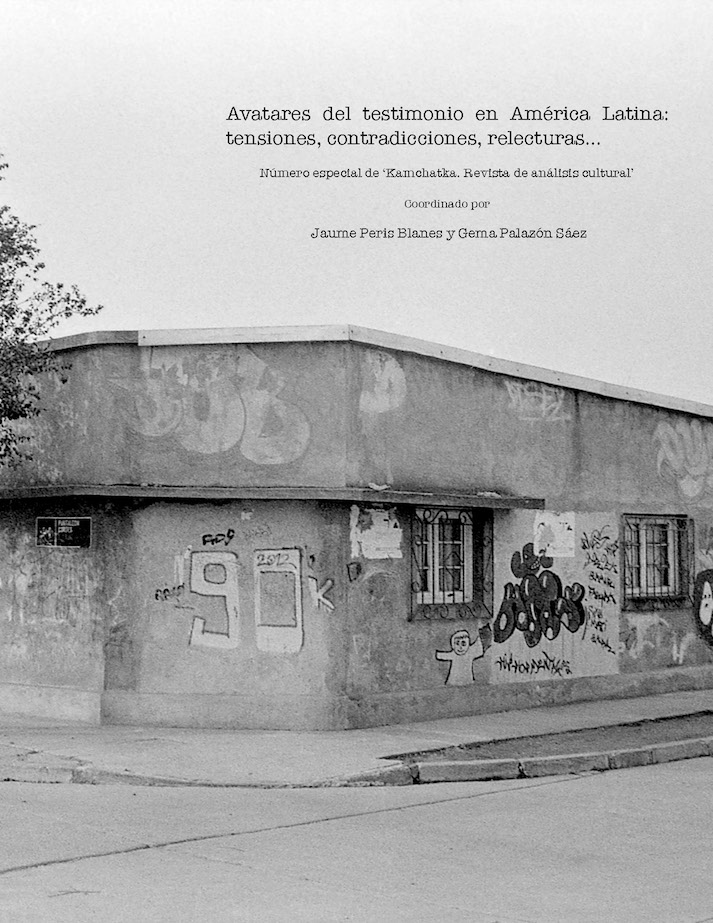Memoria, testimonio, autoficción. Narrativas de infancia en dictadura
DOI:
https://doi.org/10.7203/KAM.6.7822Keywords:
Argentina, memoria, feminismo, género, autoficción, testimonio Abstract
Abstract
Resumen: El presente artículo enfrenta vida y ficción como formas de pensar la subjetividad contem-poránea. Para ello, la autora consagra un corpus de voces femeninas marcadas por una infancia atravesada por la dictadura. Todas estas narrativas concentran re-veladoras reflexiones sobre la memoria, el testimonio y autoficción como formas de problematizar lo político y social desde el filtro de lo personal.
Palabras clave: Memoria, autoficción, testimonio, dictadura, subjetvidad, infancia, mujeres.
Abstract: The present article face life and fiction as kinds of thinking the contemporanean subjectivity. For that reason, the author establish a corpus of female voices troubled by a childhood blocking by the dictatorship. All these prose fiction focus revealing reflections about memory, testimony and autofiction, as ways to problematize the political and social matters screened by the personal view.
Key Words: Memory, Autofiction, Testimony, Dictatorship, Subjectivity, Childhood, Women.
 Downloads
Downloads
 References
References
Bibliografía Alcoba, Laura (2010). La casa de los conejos. Buenos Aires: Edhasa Alcoba, Laura (2012). Los pasajeros del Anna C. Buenos Aires: Edhasa. Alcoba, Laura (2014). El azul de abejas. Buenos Aires: Edhasa. Arfuch, Leonor (2002). El espacio biográfico. Dilemas de la subjetividad contemporánea. Buenos Aires: Fondo de Cultura Económica. Arfuch, Leonor (2013). Memoria y autobiografía. Exploraciones en los límites. Buenos Aires: FCE. Aubenas, Jacqueline (1992). “Chantal Akerman”. Propos recueillis, en Le langage des femmes. Cahiers du Grif, Bruxelles: Éditions Complexe. Benjamin, Walter (1990). Infancia en Berlín hacia 1900. Barcelona: Taurus. Benveniste, Émile (1993). Problemas de lingüística general. México: Siglo XXI. Cohen, Sara (2015). La niñez cautiva. Salud Mental infantil y juvenil. Buenos Aires: Fondo de Cultura Económica. Gadamer, Hans-Georg (1977). Verdad y método. Salamanca: Sígueme. Laplanche, Jean. Reportaje publicado en Revista Psicoanálisis ayer y hoy, 3 (2005). Pérez, Mariana Eva (2012). Diario de una princesa montonera. Buenos Aires: Capital Intelectual. Ricoeur, Paul (2004). La memoria, la historia, el olvido. Buenos Aires: Fondo de Cultura Económica. Robles, Raquel (2008). Perder. Buenos Aires: Alfaguara. Robles, Raquel 2012). La dieta de las malas noticias. Buenos Aires: Alfaguara. Robles, Raquel (2013). Pequeños combatientes, Buenos Aires: Alfaguara. Smith, Sidonie. & Watson, Julia (2001). Reading autobiography. A guide for interpreting life narratives. Minnesotta: University of Minnesotta Press. Urondo Raboy, Ángela (2012) ¿Quién te creés que sos? Buenos Aires: Capital Intelectual. Filmografía Linklater, Richard (2014). Boyhood, film, EE.UU. 165 m. Dirección y guión. Markovitch, Paula (2011). El premio, film México, 112 m. Dirección y guión.
Downloads
Published
How to Cite
-
Abstract3228
-
Artículo (Español)3965
Issue
Section
License
This journal provides an immediate free access to the content on the principle that freely make investigation available to the public, which promotes an increased global knowledge exchange.
Unless otherwise indicated, texts published in this journal are under the license Attribution-NonComercial 4.0 by Creative Commons. These texts may be copied, distributed and publicly communicated whenever the publication’s author and title are quoted and whenever they are not used for commercial purposes. In any case, intellectual property of the articles and its potential economic rights entirely belong to its authors.
The full license can be consulted on https://creativecommons.org/licenses/by-nc/4.0/. We encourage authors to disseminate papers published in Kamchatka. Journal of cultural analysis electronically, in institutional digital repository or in their websites.





